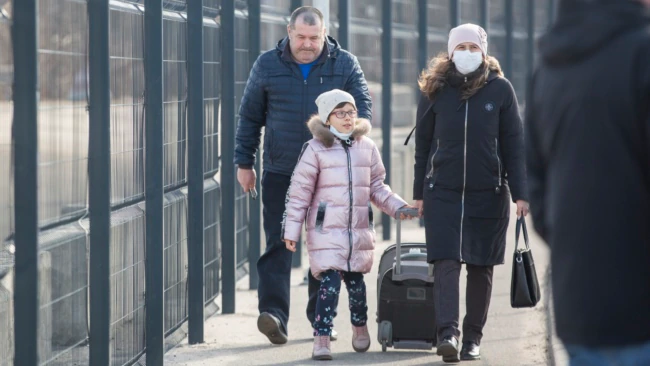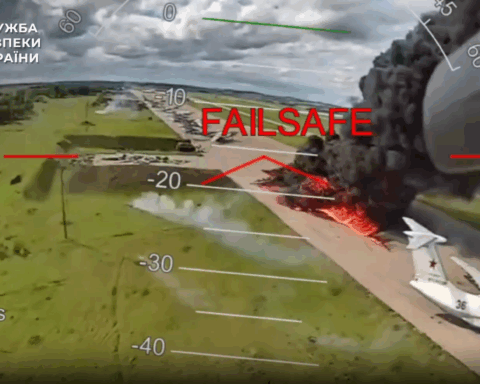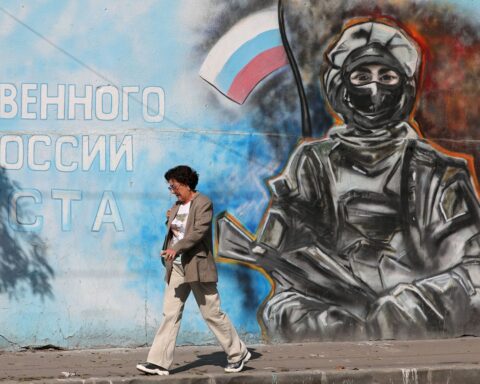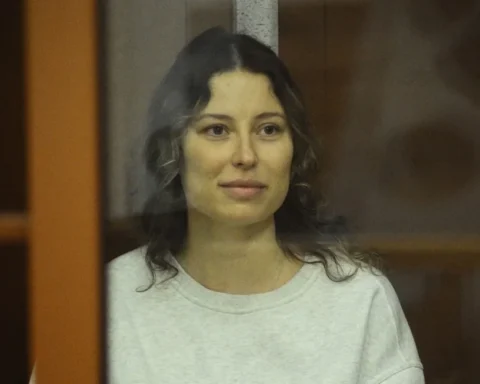STANYTSYA LUHANSKA, Ukraine — When the war first broke out eight years ago, Natalya, 28, just hid in the basement when the gunfire and artillery bombardments came too close.
“Now it’s different. Now I fear for the children,” she said, holding her 3 1/2-year-old son and 5 1/2-year-old daughter by the hand as she crossed from the city of Luhansk, held by Russia-backed separatists since 2014, into Ukrainian government-held territory. “We’re leaving for good.”
Ukraine’s long-running war, fought in the eastern Donbas region, could be on the verge of a major escalation, with more than 130,000 Russian troops poised near Ukraine’s borders and tension rising between Russia on the one hand and Kyiv and the West on the other.
The fenced-off, heavily guarded, cordoned checkpoint in Stanytsya Luhanska has been in place for years. For residents of the separatist-held city of Luhansk and the government-controlled areas to the north, it has been a major inconvenience — but one that people had gotten used to, showing passports and residence permits as if crossing an international border.
Now it feels different.
Amid increased fighting, mounting fears of a new Russian invasion, and false claims by Russian President Vladimir Putin that the Ukrainian government is committing “genocide” in the Donbas, the separatist leaders in Luhansk and Donetsk on February 18 announced mass evacuations to Russia. They later announced a general mobilization order for men aged 18 to 45 and forbade men of those ages from leaving the territories.
Without providing evidence, the separatist leaders claimed that Ukrainian government forces would soon launch a big offensive. Kyiv denied any such plans, and Western officials have accused Moscow and the separatists of planning to create a pretext for a new Russian invasion of Ukraine.
On February 20, a steady stream of people passed through the checkpoint over a period of several hours. They were not responding to the evacuation calls and were remaining in Ukraine — fleeing their homes and what they said was mounting violence, particularly in the city of Luhansk. Some said they were getting out for good.
“Of course, we’re frightened. Everyone’s frightened. No one has any idea what’s going to happen,” said Anya, a bookkeeper who stood with her 12-year-old son Danil and 6-year-old Artyom eating shawarma wraps, waiting for relatives to meet them. “What would you do in this situation?”
She said crossing the line at Stanytsya Luhanska has always been an inconvenience. It became a major problem when authorities imposed once-a month limitations for crossing, as part of efforts to limit the spread of COVID-19, which has been more problematic in the separatist-held territories.
Near the checkpoint, a small collection of pop-up shops offered groceries, shawarma, medicines for sale; across the street were a series of fitted-out shipping containers offering rapid COVID testing.
Anya said she and her husband, an agronomist, initially had no plans to leave or evacuate their apartment in Luhansk — both were still getting paid at their jobs, albeit not very much. That changed on February 19, when the separatist administrations in Luhansk and Donetsk barred all men between the ages of 18 and 45 from leaving; a day later, a general mobilization order was also ordered.

Authorities also ordered schools closed as of February 21 — not that it made that much difference, she said: Schools have been mostly doing remote learning to prevent COVID-19 from spreading. “It’s been useless. The children don’t learn anything.”
So, they decided to send the boys away to live with their grandparents, in the village of Bilokurakyne, about 150 kilometers away in government-held territory, she said. She’ll video chat with them, and hopes to see them in a month, when she’s allowed to cross again. “Unless we end up in total hell.”
‘No One Wants Us Anywhere’
The days before she crossed over with her sons, she said, there were nearly a dozen teeth-rattling explosions audible in her neighborhood. She said it was impossible to say where they came from, or who was to blame. But she said in general she and her entire family felt the world had all but forgotten about the conflict, and the people still trying to live in the area.
“No one wants us anywhere, not in Kyiv, not in Moscow,” she said. “I’m glad that maybe in Europe, or the United States, somewhere they’re reading about us.”
In Stanytsya Luhanska itself, fears spiked two days earlier when shelling that Ukrainian officials said came from the Russia-backed separatists hit a kindergarten in the town. two teachers were reported slightly injured in the incident, which left a gaping hole in the school’s brick walls.
It’s unclear how many people have left the separatist-held parts of Luhansk and Donetsk since the evacuation orders were issued. Leaders of the Russia-backed separatists have been quoted by Russian media as saying tens of thousands of people have left, mostly for the neighboring Russian region of Rostov.
‘Really Brutal’
There were no verifiable number of how many people have left Luhansk on their own, crossing into Ukrainian government-controlled territory. The Russian state news agency TASS quoted separatist authorities in Luhansk on February 20 as saying that nearly 34,000 people have crossed into Rostov.
“It’s brutal, really brutal,” said Tanya, 27, who, along with her 3-year-old daughter, had been visiting her parents in Stakhanov, a town southwest of Luhansk, not far from the line of control separating government forces from separatist fighters. “People are totally afraid what’s going to happen next. Soldiers are everywhere. There’s constant shooting.”
She said she had no idea who was doing most of the shooting.
“It’s panic, total panic,” said Tetyana, who worked on a nearby farm complex until she retired in 2012. She was evacuating Luhansk with her daughter and her 8-year-old grandson, locating to Rubizhne, the north. For them, the decision to leave came with the prohibition on military-aged men from leaving, and conscript them into the local militia forces in Luhansk.
“Why did we decide to go? When they gave the order to start taking the men” into service, she said.

Natalya, who like all the people interviewed for this article asked not to give her surname, recalled calmly hiding out in the basement in 2014 when Luhansk came under bombardment. She said she was supposed to have her first day of work on February 21, as a shopkeeper in a small grocery store in the city — but the order barring men from leaving the region and the closure of schools was the last straw.
“The children are sleeping through the night, more or less. Me? Not really,” she said.
In Novoluhanske, a frontline town on the government-held side whose outskirts briefly came under heavy artillery fire during a visit by Ukraine’s interior minister on February 19, the most common lament from residents interviewed by an RFE/RL reporter wasn’t the threat of a new invasion by Russian forces: it was that the town was dying, if not dead already: people moving away and the school all but shutting down, with a tenth of the student population it had just a few years ago.
“Why would I leave? I have three apartments here. My mother lives here, my grandmother. Besides, where I would go? I’ve lived here all my life. It’s my home. My town,” said Serhiy Kraynov, 26, as his 6-year-old son Zhenya played on a decrepit, rusting playground.
Still, he said: “Yes, the shooting, the artillery in recent days has definitely been serious; haven’t heard anything like this in a long time.”
“We had a nice town. There were lots of children. All the homes were full. After 2014, 2015, everyone left,” said Olesiya, a 65-year-old retiree who has been selling bread from a dilapidated kiosk for the past six months to supplement her monthly pension of 3,000 hyvnyas ($106).
Asked if she would move away in the event of full-blown new war, she laughed.
“And where would I go? No one needs me. No one needs us at all here,” she said.

Back at the Stanytsya Luhanska crossing, Iryna crossed over with her 7-year-old daughter and 2-year-old son, leaving Luhansk to go live with relatives in Starobilsk, about an hour’s drive north, until further notice.
She said she hasn’t been working since her husband died a year ago, of an illness she declined to identify; she said she’s been making ends meet with help from her in-laws and small government payments for single mothers.
“Some people are staying. Most are leaving,” she said, referring to families with school-age children, as her younger son sat down in the middle of the road, covered in crumbs from a chocolate pastry. “Is there panic? I wouldn’t say so. There’s serious fear now. It hasn’t been like this in years.”
Asked about the near-nightly explosions that are reportedly heard in the city, she said quietly: “We try not to talk about it in front of the children.”







